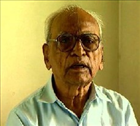He is the man who introduced Lata Mangeshkar to Hindi cinema. Unfortunately this one aspect of his life has overshadowed all his other achievements.
Datta Davjekar lives a simple life on the fringes of Andheri's Lokhandwala Complex in Bombay. "I am willing to do films even today," smiles the octogenarian. "I have just completed the background score for a 45-minute documentary about a group of brave men who conquered Mount Everest."
To today's generation, the fact that Davjekar did the score for merely 60 films in 52 years (most of which were in Marathi) must sound ridiculous. But then those were the days when life was a little less hectic and people were happy to take things easy.
He began at the very beginning. "My father Baburao Davjekar used to play the tabla for tamasha acts as well as for Urdu plays directed by Sohrab Modi's brother, Keki. I picked up the instrument and used to play at Ganpati melas and charge Rs. 4 for 10 days. I then got interested in playing the harmonium and in composing tunes," Davjekar reminisces.
The perfect opportunity came in the third year of the fair when a teacher fell ill. "So I was asked to compose the music for about 10 songs," he continues. "One thing led to another and I got to learn other instruments. I was also invited by Shanta Apte, a big star in those days, to perform on her shows and was paid a then-princely salary of Rs. 20 a month. I went to places as far as Lahore, Amritsar, Simla, Allahabad and Patna. It's after that I became a film- musician. Later, I assisted music directors like C. Ramchandra and Chitragupta in the '50s."
His film career began in 1941 with Municipality which was produced by Davjekar's college friend Koshi. His second film, Sarkari Pahune (1942) was remarkable because it was a Marathi film which had a Hindi song. Says the veteran, "The maker of this film, V.S. Khandekar, was a Jnanpith award winner. He wanted a song for a competition scene in which the famous Vishnupant Jog was to sing and top star Vatsala Kumatkar dance. When Khandekar asked me if I could do a Hindi song, I agreed. I looked up a few
Hindustani Sangeet Paddhati books by Professor Bhatkhande and composed the song, “Naache sangeet natwar bhekh dhare, taandav nritya kare." The film, as well as the song, was a big hit.
The subject of Lata Mangeshkar inevitably came up. "I was employed by Vasant Joglekar who sent this young girl to me one day. She wanted to be a singer and Joglekar asked me to assess how good she was. And that's when I heard Lata for the first time, even though she had already sung in films like Kiti Hasaal (which never got released) and Pahili Mangalagaur in the late 30's. I heard her sing and then told Joglekar, 'Pay her whatever money you want, but don't lose her. She's enormously talented!' I recorded my first songs with her for Maazhe Baal in 1943," recounts Davjekar.
Davjekar worked in just three Hindi films. And in the very first film Aap Ki Sewa Mein (1947), he used Lata's voice for a few songs, marking her Hindi debut. "The song Paa lagoo kar jori re was written by actor Mahipal," he says. Joglekar's Aap ki Adalat and Premnath's own production Prisoner of Golconda (1954), a Hindi-English bi-lingual, were the other two films Davjekar worked in.
However, it is Asha Bhosle who has recorded the maximum songs for Davjekar - about 100. "In Maazhe Baal, the song Chalaa chalaa nav bala was recorded by all four sisters - Lata, Asha, Usha and Meena Mangeshkar," he tells us. Talking about the two famous Mangeshkar sisters, Davjekar says, "Both Lata and Asha are in a class of their own, though Asha is more versatile. As for Lata, her speciality is the way she leaves one line to go on to the next, the pronunciation is crystal clear." But he is averse to describe Lata as his student or even as his discovery. Incidentally, Davjekar also introduced Anuradha Paudwal to Marathi film singing with Yashoda and gave Sudha Malhotra a break in Prisoner of Golconda.
Between 1941 and 1962, Davjekar worked with big names like Raja Paranjape, Gajanan Jagirdar, Master Vinayak (actress Nanda's father), Dinkar Patil, Datt Dharmadhikari, Rajdutt and Raja Thakur. His famous films include Rangalya Raatri Ashyaa, Pathlaag, Paahu Re Kiti Vaat, June Te Sone, Santh Vahate Krishna Mai, Yashoda, with his last release being Vaat Pahaate Punvechi in 1992. He has also composed music for 12 plays including Thank You Mr Glad for which he learnt German music.
Among his more famous songs are Sultan shahar ke yaar hum to municipalitywale and Sainik ho tumchyaa sathi, the royalty collected from which was given to the Armed Forces. The 82-year-old Davjekar also received the Lata Mangeshkar Puraskar in 1995.
He does not think highly of today's music, but he does admire the works of Hridaynath Mangeshkar and Shridhar Phadke. As a music composer, Davjekar liked to set the tune first, but all that changed when he started working with the late G. D. Madgulkar. The legendary lyricist never agreed to pen words to a previously composed tune. "I even composed a 15-minute song on his verse," he says.
Surprisingly, Davjekar is a reluctant composer. "My main interest," he states, "is electronics. My son Vijay is an electronic engineer and I have developed instruments like 'sur-peti,' besides being the first music-director in India to use the claviolin in 1955." His daughters Lalita and Aparna are singers, though Aparna is a practising doctor.


